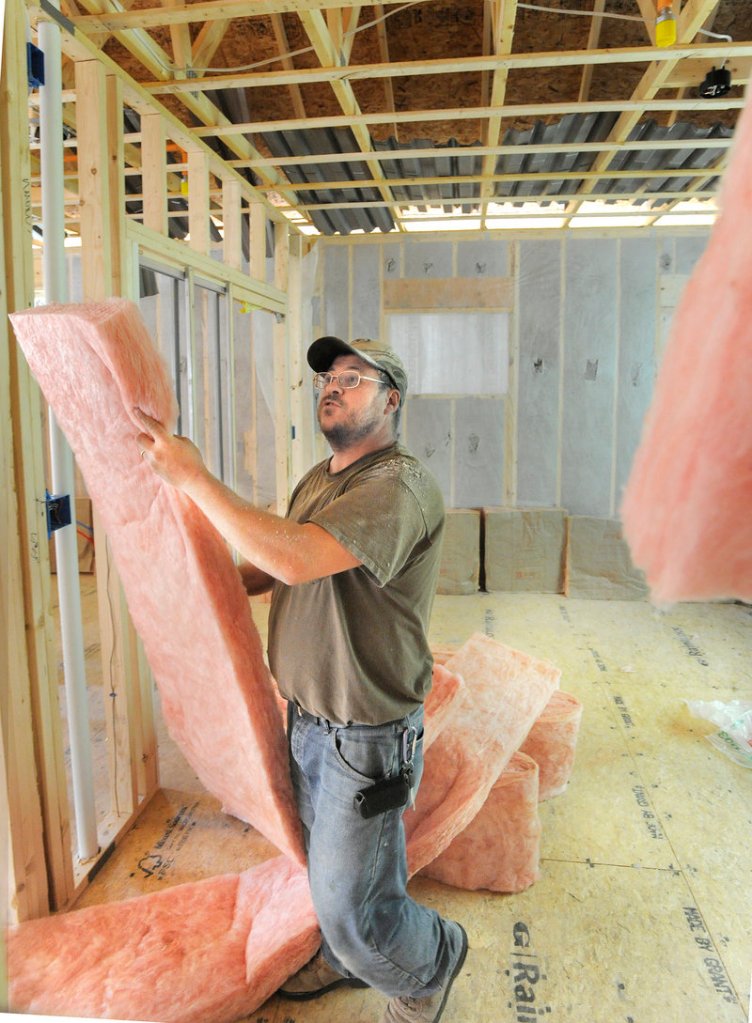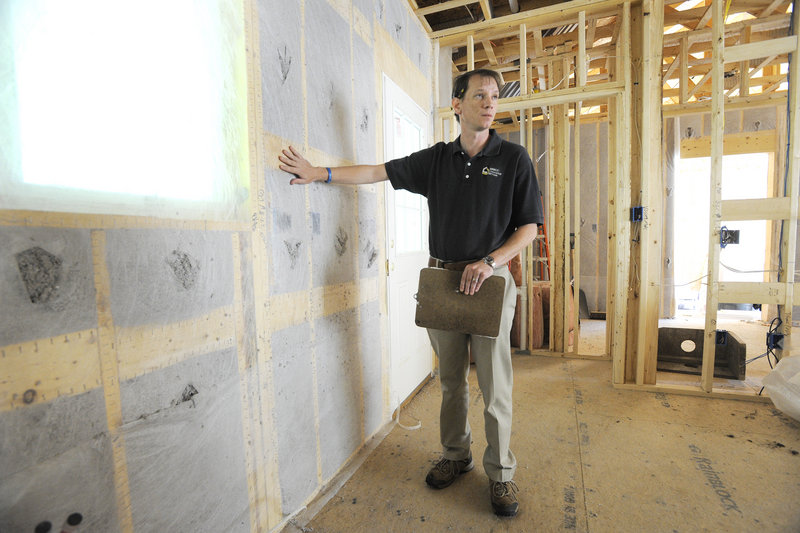FALMOUTH – The homeowners won’t see it, but the stud walls of a new house being built in the Ridgewood subdivision here were stapled tight last week with a fine-mesh netting. Insulation contractors blew dense cellulose behind the netting, pumping it into tiny cracks through which heated air would otherwise escape in winter.
“You really need to fill all the nooks and crannies,” said Jerry Brown, assistant manager at Quality Insulation in Yarmouth. “You need a solid seal.”
This air-sealing technique is a common way to create an energy-efficient house in 2010, but most Maine home builders don’t do it. Despite all the media chatter about green building, most new homes in Maine are being insulated to standards that were cutting edge when Ronald Reagan was president.
That’s about to change.
A few weeks ago, Maine formally adopted rules for a mandatory statewide energy code for new homes and substantial renovations. Starting in December, construction in communities with more than 2,000 residents must meet the code.
Maine had been among only 11 states without any minimum residential energy standards. A small number of municipalities, such as Falmouth, have adopted local versions.
Some large builders aren’t happy about the statewide rules because they will add to the cost of a new home. They say customers are more interested in hardwood floors and granite countertops than how much insulation’s in the attic.
This view is shortsighted, state officials say, when millions of taxpayer dollars are going to weatherize leaky homes and cut the state’s oil dependence. It’s less costly in the long run, they say, to do the job right the first time.
After years of debate and voluntary standards that were largely ignored, Maine is adopting the latest version of the International Energy Conservation Code.
The home energy rules are part of a package of new building codes coming into effect. Many builders are just getting up to speed on what’s required, and how it will change what they do today.
Mainstream insulation practices haven’t changed much since the late 1980s, when 2-by-6 stud walls became common. Most builders shove fiberglass batts with an R-19 insulating value in the walls, and line the attic and roof with up to R-38. They typically don’t insulate the foundation or floor. And they don’t do air-sealing.
BUILDERS QUESTION LOGIC
The new code requires a minimum of R-20 in the walls, R-49 in the attic and R-30 in the floor. It also requires sealing all joints, seams and penetrations, such as attic hatches and plumbing holes.
These steps can make a home more comfortable and cut heating bills by at least 20 percent, compared to the old-school insulating method, according to Efficiency Maine Trust, the state’s new energy agency.
But a couple of southern Maine’s top builders question whether it’s worth the extra money.
Bill Risbara, co-owner of Risbara Bros. in Scarborough, said a standard insulation package costs $2,500 in a starter house. The new code will add $1,000, which is money that first-time buyers would rather spend on amenities.
“My people would give up energy savings for a hardwood or tile floor any day of the week,” Risbara said.
In higher-end homes, Risbara has used spray foam, which has a high insulating value and fills tiny cracks. It makes a noticeable difference but is expensive and requires heat-recovery ventilation for indoor air quality.
The extra efficiency doesn’t make financial sense in starter homes, he said, because owners plan to move up.
“They’ve got a three- to five-year attention span,” he said.
That’s also the observation of Mark Patterson, president of the Home Builders & Remodelers Association of Maine. He’s a co-owner of Patco Construction in Sanford, which specializes in two-bedroom starter homes.
Patterson offers an upgraded insulation package, but it costs $2,500 more. Buyers would rather put that money into a kitchen or bathroom upgrade, he said.
This attitude is frustrating to Ashley Richards, who’s on the board of the builders group but also runs an insulation company, WarmTech Solutions in Yarmouth.
EFFICIENCY NOT SEEN AS ADVANTAGE
He sees a disconnect: In some states, builders use energy efficiency as a selling point. They guarantee a home’s performance and lower power bills. But Maine buyers don’t seem focused on energy efficiency, despite well-publicized concerns about high oil prices. As a result, mainstream builders don’t see any competitive advantage in offering efficiency.
Maine home builders, who have successfully fought attempts to license their trade, seem particularly resistant to government mandates. They tend to be family-owned companies that develop their own ways of doing business.
Richards said he met with a well-respected builder in eastern Maine who puts hardly any insulation in his homes. Richards asked him why.
“My grandfather told me a house has to breathe,” the man replied.
Maine has a stable of custom builders and green contractors who market energy efficiency, but it’s rare for high-volume contractors.
An exception in southern Maine is Kasprzak Builders of Waterboro, which focuses on condominiums. All its homes are certified to meet federal Energy Star standards.
Customers rarely ask about insulation levels, according to John Roberts, the company’s construction supervisor, but most are at or near retirement age and are concerned about heating bills. They can expect to use roughly 550 gallons a year of heating oil in a 2,000-square-foot unit, below the state average.
But even Kasprzak will need to up its game to comply with the new energy code. While its insulation and window specs are at or above the code, workers will have to do more air sealing, Roberts said.
At the new Falmouth home, Brown underscored the importance of sealing cracks and joints. He pointed to where expanding foam had been sprayed around door and window frames. He explained how cellulose had been blown behind electrical boxes, to eliminate drafts.
This work is labor-intensive. It takes roughly twice as long to insulate to the new code, Brown said. And it takes training. Builders in communities that already have strict energy ordinances will have a leg up, Brown said.
“I think the biggest challenge is going to be education,” he said.
The new law requires code enforcement officers or independent auditors to verify the insulation and air sealing. They’ll have the option of using equipment that depressurizes the house to detect leaks, or visual inspection. Training is ramping up now.
Meanwhile, the program specs are going through the rule-making process in Augusta and will be reviewed at a public hearing this summer. They will be administered by a new agency, the Bureau of Building Codes and Standards.
While the new code represents an improvement from current practices, it’s only a minimum standard, according to Rick Meinking, an energy management expert at Efficiency Maine Trust.
Nationally, many homes are being built to the EnergySmart Home Scale being promoted by building groups and the federal government. If offers a “miles-per-gallon” measurement of a home’s energy performance, so buyers can compare a house, just as they do a car. Maine’s new code could be a first step to an energy-rating system, Meinking said, to encourage builders to raise the bar.
“We have learned a lot in our building practices,” he said. “If we do these small things, we can make a big difference.”
Staff Writer Tux Turkel can be contacted at 791-6462 or at:
tturkel@pressherald.com
Copy the Story Link
Send questions/comments to the editors.





Success. Please wait for the page to reload. If the page does not reload within 5 seconds, please refresh the page.
Enter your email and password to access comments.
Hi, to comment on stories you must . This profile is in addition to your subscription and website login.
Already have a commenting profile? .
Invalid username/password.
Please check your email to confirm and complete your registration.
Only subscribers are eligible to post comments. Please subscribe or login first for digital access. Here’s why.
Use the form below to reset your password. When you've submitted your account email, we will send an email with a reset code.